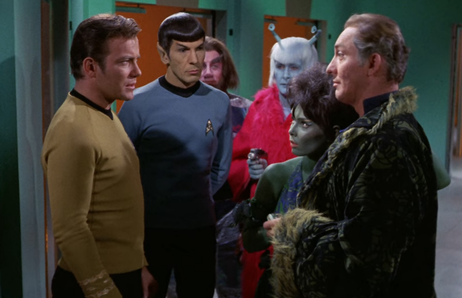Written by John Edward Betancourt  When we often take the time to think about a utopian future, we imagine a world where all of our problems are solved. A place with no hunger, no sorrow or war, just peace and tranquility and that’s why Star Trek resonates so well with its audience. Because it features just that, and it is quite wonderful to see a future for mankind where we live in peace and harmony and explore the stars as well. But while that vision is indeed refreshing and hopeful in its own right, the franchise also deserves serious credit for taking the time to remind us that despite the progress that was made in creating this better world, progress takes a lot of time, and there is always more work to do. Something that later iterations of the series examine in great detail by way of war and poor decisions from Starfleet. But oddly enough, The Original Series did have a few moments here and there where it took the time to explore those particular points as well. And it just so happens that the next episode of this storied series, is one that dives deep into the fact that there are corners of the Federation in the 23rd Century, where some of the problems that plagued mankind in past years, still exist and still need to be dealt with. Which makes ‘Whom Gods Destroy’ quite the brilliant tale. Because it tackles and examines something that is as taboo now in popular media, as it was back in 1969; mental illness. Which is indeed something that one would think would be eliminated in 2268, but alas, this particular tale sees Kirk and Spock visiting an asylum for the criminally insane, and what makes this part of the story hopeful and inspiring, is the sheer fact that Starfleet and the Federation are trying their best to solve this age old problem. For the mission here is to deliver a revolutionary drug that should heal these broken minds and well, it doesn’t take long for this story to take quite the turn when Kirk and Spock come to learn that an ultra-famous patient here has taken control of the asylum, forcing Kirk to have to try and outright outwit a former hero of the Federation. Which makes for some incredible storytelling. Because this tale quickly goes from showing us that there are still modern problems in the 23rd Century, to becoming a poignant parable on the power of mental illness and how it can impact anyone at any time since Fleet Captain Garth, who was once a brilliant tactician, is a shell of his former self because of his mental state. But what matters the most about how mental illness is portrayed in this tale is that it is presented without opinion or judgment. We just know that Garth is isn’t well, and that he needs help and it is quite refreshing to see Captain Kirk try and aid his hero and not insult or tear down a man who is clearly incapable of understanding the situation, because of his brain chemistry. If anything, the only complaint one can offer up in regard to this episode, is that it clearly holds back in its exploration of this topic. But alas, this was the only way to present it without making this episode hyper controversial. Because America simply wasn’t ready to have that discussion just yet, in fact, we’re just barely getting around to properly acknowledging mental illness and removing the taboo surrounding it. Which makes this episode ahead of its time for certain and powerful as well and this is another tale that speaks to what wonders this series could have accomplished with a few more years on the air. But rather than lament the show’s end, it’s best we just take a moment celebrate this brilliant and pioneering tale. One that spotlighted something that honestly needs to be discussed more often in fiction. Until next time.
0 Comments
Leave a Reply. |
Archives
April 2025
|
|
© 2012-2025, Nerds That Geek LLC.
All Rights Reserved. |
uWeb Hosting by FatCow

 RSS Feed
RSS Feed